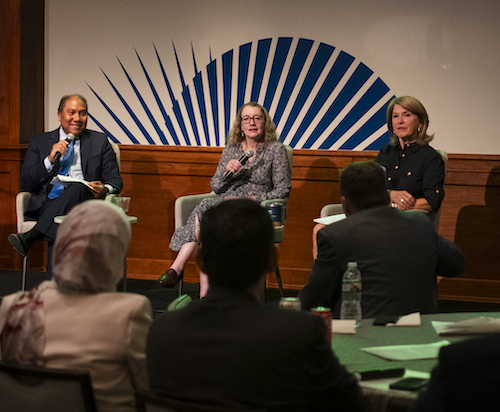International Judges and Journalists Exchange Ideas on Transparency and Accountability, by Karen Walker
Judicial Fellows from 18 countries discussed the relationships between their courts, the media, and public trust in a panel with U.S. journalists convened Oct. 3 by the Presidential Precinct and the U.S. Chamber Foundation. Luis Botello, President of the Media for Democracy Foundation, moderated the panel on Transparency, Accountability, and Courts in the Media Age with NPR national justice correspondent Carrie Johnson and veteran journalist Kathleen Matthews. (In the photo, Botello, Johnson and Matthews l-r.)
 “Journalists and judges have a calling to the greater good,” Matthews said, furthering a conversation on how to build constructive relationships between the judiciary and the press. Examples include creating a media plan for high-profile cases and establishing overflow rooms for journalists to monitor court proceedings. The panelists encouraged the judges to focus their attention on the integrity of their courts’ public affairs and public information processes, rather than trying to frame or control media coverage. The panelists also passed along helpful suggestions to support accurate reporting while a proceeding is underway, such as reliance on retired justices as surrogate speakers.
“Journalists and judges have a calling to the greater good,” Matthews said, furthering a conversation on how to build constructive relationships between the judiciary and the press. Examples include creating a media plan for high-profile cases and establishing overflow rooms for journalists to monitor court proceedings. The panelists encouraged the judges to focus their attention on the integrity of their courts’ public affairs and public information processes, rather than trying to frame or control media coverage. The panelists also passed along helpful suggestions to support accurate reporting while a proceeding is underway, such as reliance on retired justices as surrogate speakers. Civic education, such as judges’ job talks and visits with secondary school students, emerged as a critical step toward public trust. The judges considered ways to engage communities outside the courtroom and educate citizens about their work and its challenges in non-partisan, non-case related forums. The judges considered ways to put a human face on the court and how civic education may inoculate the public against misinformation and inspire confidence in judicial integrity.
The Judicial Fellowship Program builds a network of judicial leaders equipped to uphold justice in increasingly complex contexts. This two-week exchange program promotes both professional growth and cross-cultural understanding, laying the groundwork for enduring partnerships that can strengthen democracy and accountability worldwide.
“The program cultivates the kind of leadership that our era demands—thoughtful, principled and resilient in the face of uncertainty,” said Toyosi Ogunseye, President and CEO of the Presidential Precinct. “If we agree that societies function effectively when they commit to a common set of rules agreed on by them, then we have a responsibility to support those upholding these rules,” Ogunseye said.
“By linking judicial leadership to democratic governance, economic opportunity, and civic engagement, we ensure that the Judicial Fellowship Program is more than a training experience,” said Melissa Mendizabal, U.S. Chamber Foundation innovation manager. “These judicial fellows are a catalyst for sustainable change, who will return home actionable ideas to strengthen the social and economic foundations of their countries,” Mendizabal said.
The U.S. Chamber Foundation and the Presidential Precinct launched the Judicial Fellowship Program in fall 2024. Their partnership unites two distinct but complementary strengths: the Foundation’s ability to anticipate and address community and economic challenges, and the Precinct’s expertise in cultivating principled, globally minded leaders. Learn more about the program, the 2025 Fellows and 2024 alumni on the Fellowship's web page.